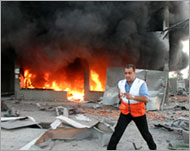Air strikes test Lebanese unity
As fighting escalates between Israel and Hezbollah, there are growing concerns that the conflict will cause Lebanon’s delicate political consensus to unravel.

Since Hezbollah attacked Israeli border positions on Wednesday, killing eight soldiers and capturing two, Israel has struck not only Hezbollah targets but also Lebanese infrastructure.
“Israel’s strategy is to tell the Lebanese that they don’t need Hezbollah,” says Dr Yossi Mekelberg, a Middle East analyst at Chatham House think-tank in London.
“The message to the region is that Israel won’t tolerate attacks across the border from Lebanon and that regional powers need to resolve this.”
Israel’s demands
Tel Aviv demands that Lebanon’s government disarm Hezbollah and send the Lebanese army to secure its border with Israel to prevent further cross-border attacks.
However the attacks have not yet persuaded the Lebanese government to force Hezbollah to disarm. Instead they appear to have had the opposite effect.
“The Lebanese feel that they are under attack and this has created a bipartisan feeling that we should all unite,” says Misbah Ahdab, an independent Sunni MP and a long-standing opponent of foreign involvement in Lebanon.
“Israel wants to separate Hezbollah from the Lebanese people,” he says. “But instead the Lebanese feel that the Israeli aggression is not just targeting Hezbollah but all of Lebanon.”
Economic costs
In just a few days Israel’s military has destroyed bridges, roads and fuel stations – all expensively rebuilt since the civil war.
 |
|
Smoke rises after an air raid |
“We are all thinking about the financial bill that we will have to pay for all this destruction,” says Ahdab. “Already Lebanon has a national debt equivalent to 150% of its GDP. This will make it worse. How can we pay for it?”
Many Lebanese also resent the fact that Hezbollah is funded by the Iranian government and that its policies are driven by loyalty to Iran and the worldwide Shia community rather than to its fellow Lebanese.
Sectarian conflict
Hezbollah’s divided loyalties have highlighted the country’s sectarian divisions – particularly because the most prominent critics of Hezbollah are also the leaders of rival religious groups.
On Friday Cardinal Nasrallah Sfeir, the head of the Lebanese Maronite Church and a long-standing opponent of all foreign interference in Lebanon issued his own criticism of Hezbollah.
He said in a statement: “We also hope that Hezbollah will finally lay down its arms and join the other citizens of Lebanon in reaching political solutions to all of the Lebanese problems.”
Sfeir also backed Israeli demands for the Lebanese army to occupy southern Lebanon and prevent Hezbollah from attacking Israel.
“We look forward to a united, sovereign, free, and truly independent Lebanon, where the Lebanese government exerts its sole authority over all of Lebanon’s territory,” he said, speaking from the US.
Growing criticism
Analysts say that these criticisms, and the sectarianism implicit within them, may become increasingly common as Israeli attacks continue.
“The Israeli bombings have deepened the polarization of society and created a sense that it is the Shia community versus everyone else,” says Nicholas Blanford, a Beirut-based journalist and analyst.
 |
|
A burning petrol station |
“Other communities are angry – they see that Hezbollah have dragged Lebanon back into the Arab-Israeli conflict,” says Blanford. “But so far criticism has been muted. There is a sense that Lebanon is under attack and that now is not the time to start pointing fingers – but that may change.”
Difficult choices
Meanwhile the West will face difficult choices if it tries to end the violence in Lebanon.
“The easiest scenario for the international community is for them to turn to Syria to solve this problem,” says Shehadi. “But this would mark the end of the Bush doctrine that says the US will not make deals with dictators.”
“The other option is that the US will refuse to grovel to Syria and will not ask them to solve this,” he says. “But if this happens there might well be further regional escalation and this would mean that the interests of the Lebanese people will be forgotten.”